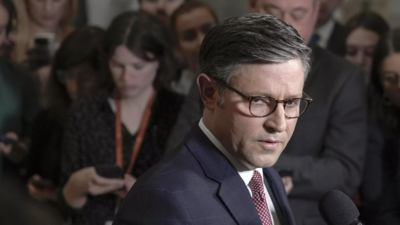- News
- World News
- Europe News
- Why Mike Johnson is risking his speakership for Ukraine's aid
Trending
Why Mike Johnson is risking his speakership for Ukraine's aid

US Speaker Mike Johnson (File Photo)
For weeks after the Senate passed a sprawling aid package for Ukraine, Israel and Taiwan, Speaker Mike Johnson agonised over whether and how the House would take up funding legislation that would almost certainly infuriate the right wing of his party and could cost him his job.
He huddled with top national security officials, including William Burns, the CIA director, in the Oval Office to discuss classified intelligence.He met repeatedly with broad factions of Republicans in both swing and deep red districts, and considered their voters' attitudes toward funding Ukraine. He thought about his son, who is set to attend the US Naval Academy in the fall.
And finally, when his plan to work with Democrats to clear the way for aiding Ukraine met with an outpouring of venom from ultraconservatives already threatening to depose him, Johnson knelt and prayed for guidance. "I want to be on the right side of history," Representative Michael McCaul, the chairman of the Foreign Affairs Committee, recalled the speaker telling him.
Johnson's decision to risk his speakership to push the $95 billion foreign aid bill through the House on Saturday was the culmination of a remarkable personal and political arc for the Louisiana Republican. It was also an improbable outcome for a man plucked from relative obscurity last fall by the hard right - which had just deposed a speaker they deemed a traitor to their agenda - to be the speaker of a deeply dysfunctional House.
"History judges us for what we do," he told reporters at the Capitol last week. "I could make a selfish decision and do something that's different. But I'm doing here what I believe to be the right thing. I think providing lethal aid to Ukraine right now is critically important." Johnson attributed his turnabout in part to the intelligence briefings he received. "I really do believe the intel," Johnson said. "I think that Vladimir Putin would continue to march through Europe if he were allowed. I think he might go to the Baltics next. I think he might have a showdown with Poland or one of our Nato allies."
One of the most impactful briefings, according to people familiar with the discussions, came in Feb in the Oval Office, when congressional leaders met with Biden to discuss govt funding and aid for Ukraine. At that meeting, Burns and other top national security officials sought to impress upon Johnson how rapidly Ukraine was running out of ammunition, and how dire the consequences would be if their air defences were no longer reinforced by American weaponry.
For his part, Johnson skipped a victory lap on Saturday"I'm going to do my duty, and the results are not up to me. We'll see what happens."
He huddled with top national security officials, including William Burns, the CIA director, in the Oval Office to discuss classified intelligence.He met repeatedly with broad factions of Republicans in both swing and deep red districts, and considered their voters' attitudes toward funding Ukraine. He thought about his son, who is set to attend the US Naval Academy in the fall.
And finally, when his plan to work with Democrats to clear the way for aiding Ukraine met with an outpouring of venom from ultraconservatives already threatening to depose him, Johnson knelt and prayed for guidance. "I want to be on the right side of history," Representative Michael McCaul, the chairman of the Foreign Affairs Committee, recalled the speaker telling him.
Johnson's decision to risk his speakership to push the $95 billion foreign aid bill through the House on Saturday was the culmination of a remarkable personal and political arc for the Louisiana Republican. It was also an improbable outcome for a man plucked from relative obscurity last fall by the hard right - which had just deposed a speaker they deemed a traitor to their agenda - to be the speaker of a deeply dysfunctional House.
As a rank-and-file hardliner, Johnson had largely opposed efforts to fund Kyiv's war effort. And early in his speakership, he declared he would never allow the matter to come to a vote until his party's border demands were met. But by the time he made clear he planned to band together with Democrats to muscle through the aid package over the objections of many in his party, Johnson was speaking a starkly different language.
"History judges us for what we do," he told reporters at the Capitol last week. "I could make a selfish decision and do something that's different. But I'm doing here what I believe to be the right thing. I think providing lethal aid to Ukraine right now is critically important." Johnson attributed his turnabout in part to the intelligence briefings he received. "I really do believe the intel," Johnson said. "I think that Vladimir Putin would continue to march through Europe if he were allowed. I think he might go to the Baltics next. I think he might have a showdown with Poland or one of our Nato allies."
One of the most impactful briefings, according to people familiar with the discussions, came in Feb in the Oval Office, when congressional leaders met with Biden to discuss govt funding and aid for Ukraine. At that meeting, Burns and other top national security officials sought to impress upon Johnson how rapidly Ukraine was running out of ammunition, and how dire the consequences would be if their air defences were no longer reinforced by American weaponry.
For his part, Johnson skipped a victory lap on Saturday"I'm going to do my duty, and the results are not up to me. We'll see what happens."
End of Article
FOLLOW US ON SOCIAL MEDIA










